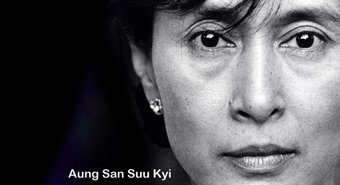“Regime change can be temporary, but value change is a long-term business. We want the values in our country to be changed.”
As a contemporary figure making women’s history, Daw Aung San Suu Kyi reflects the kind of ‘power-to’ leadership which is truly earth shattering.
“Regime change can be temporary,” she says, “but value change is a long-term business. We want the values in our country to be changed. “
Winner of the Nobel Peace Prize in 1991 Daw Aung San Suu Kyi is the leading pro-democracy opposition leader in Myanmar, formerly known as Burma, one of the world’s most isolated and repressive nations.
Since a military junta grabbed power of the country in 1962, it has secured its power by rigging elections and suppressing opposition. Ms. Aung San Suu Kyi spent 15 of the last 20 years under house arrest after her party, the National League for Democracy, won an overwhelming victory in the 1990 elections but was denied power. In November 2010 elections, Myanmar’s main military-backed party won in a vote again engineered to assure the military’s continued grip on power. The National League of Democracy boycotted this election and called it what it was—undemocratic.
Ms. Aung San Suu Kyi—who was released from house-arrest November of 2010—and her party, the National League for Democracy, have chosen to participate in elections this time around. On April 1 of this year, Suu Kyi and other pro-democratic candidates will run for 47 of the 48 open seats in Parliament.
Her campaign speech, which will appear on National TV, will mark the first time the Nobel Peace laureate has been given the opportunity to use state media to promote her party’s platform. She calls for amending the 2008 constitution, which was drafted with the army’s guidance. She boldly criticizes its automatic allocation of 25 percent of the parliamentary seats to unelected representatives of the military.
Some critics worry that Ms. Suu Kyi’s oppositional message will be tainted as she moves forward, vying for a place within a political system that imprisoned her for fifteen years. Perhaps, but her brave movement from outsider criticizing the way her country is being run to insider willing to get her hands dirty and propose solutions from within the system gives her a rare chance to make the lasting values change she seeks.
The popular desire for democracy is undeniable in Myanmar. Ms. Suu Kyi has long represented the possibility of a more socially just society. If elected, she favors repealing repressive laws, ensuring the judicial system is independent, allowing full freedom of the media and expanding the network of social assistance in Myanmar to include legal aid.
On this day in Women’s History Month, Aung San-Suu Kyi, stands among the likes of historical leaders of democratic and non-violent resistance movements such as Martin Luther King, Jr., Nelson Mandela, and Mohandas Ghandi, as she relentlessly organizes to bring about her vision of a freer society in Burma.
Whether she wins the election or not, she has made history.
Catherine Engh
Latest posts by Catherine Engh (Posts)
- Slutwalks and Such: Who’s Making Women’s History Today? - April 2, 2012
- “Black Woman Novelist” -Toni Morrison Defines Her Own Terms - March 23, 2012
- Lesser-Known Women Often Make History - March 19, 2012






 "Female Writers Kicking Up Literary Dust"
"Female Writers Kicking Up Literary Dust"